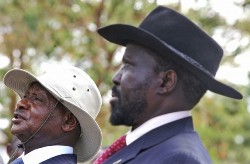Uganda’s role in S. Sudan may derail peace talks: rebels
By Tesfa-Alem Tekle
February 6, 2014 (ADDIS ABABA) – A member of the SPLM in Opposition – a rebel entity that emerged following a split within South Sudan’s ruling party – on Thursday claimed his team was less optimistic about prospects of success in the next round peace talks with government.

The rebel official, speaking to Sudan Tribune from the Ethiopian capital, Addis Ababa, insisted Uganda removes all its troops from South Sudanese territory and take a neutral position over what he described as an “internal” crisis.
Uganda, a member of the Intergovernmental Authority on Development (IGAD), has been facilitating talks between South Sudan’s warring parties since early January.
The presence of the Ugandan People Defense Forces (UPDF) in South Sudan was one of the main sticking points in the first round of peace talks, which culminated in a fragile ceasefire deal signed on 23 January.
Kampala’s role in the conflict, rebel official told Sudan Tribune, could disrupt the IGAD brokered peace talks due to resume on 10 February in Addis Ababa.
Despite the truce agreement, however, government forces and rebels have continued fighting in Jonglei, Unity and Upper Nile states where large parts of the military defected to form the SPLM/A in Opposition, led by ex-vice president Riek Machar.
Speaking to Sudan Tribune, Dr. Solomon Mokonnen, a political analyst blamed Uganda’s continued military presence in the country as well as a delayed deployment of IGAD ceasefire monitoring group as the two major causes that prevented an immediate implementation of the cessation of hostilities agreement signed two weeks ago.
“Ugandan troops must have moved out of South Sudan immediately after ceasefire and it is a shame why IGAD failed to push and make sure [of] their withdrawal” said Mokonnen.
The rebel negotiators accused IGAD of doing nothing in response to Uganda’s continued meddling in South Sudan, despite complaints they filed to the regional bloc over the matter.
“We believe that it will not be possible for IGAD to bring peace through Addis Ababa while fighting war through Kampala,” said Gatwech.
Uganda initially said it sent troops to South Sudan to secure a safe evacuation of its citizens stranded at the conflict that erupted in mid-December last year.
Later, however, Kampala admitted its troops were battling forces loyal to Machar alongside South Sudan army (SPLA), a statement, which swiftly complicated the peace process in Addis Ababa.
Uganda’s President Yoweri Museveni is a close ally to South Sudan’s President Salva Kiir and deployed the UPDF to Juba just days after the conflict broke out. Museveni had earlier also threatened the rebels with defeat.
Kiir’s government has maintained that Ugandan forces will not leave South Sudan until peace and stability is restored in the two-and-half-year-old East African nation.
“IGAD must choose one thing so it doesn’t loose credibility and we want it to choose peace,” added the rebel negotiator.
As well as South Sudan, Uganda has deployed troops in Somalia, Democratic Republic Congo and the Central African Republic. Many East African political analysts have described Museveni as a ‘regional war monger’.
The agenda of the next round of talks will focus on identifying the root causes of the conflict, as well as political and national reconciliation, according to IGAD.
Seven senior members of the ruling party, who were accused of being involved in the violence on December 15 – which Kiir’s government says was an attempted coup – were recently freed to Kenya after being held for over a month. They are all expected to attend the talks.
The remaining four senior political figures being held in Juba, who are accused of treason alongside Machar remain in prison regardless of immense pressure from the international community on President Kiir.
Members of Machar’s negotiating team in Addis Ababa told Sudan Tribune that rejecting to release the remaining four leaders was an indication that President Kiir is not interested in the forthcoming talks in Addis Ababa.
With regard to the four political prisoners rebel leader, Riek Machar, recently told Reuters that it “will not be an inclusive peace process if they’re not there [at the talks]. A non-inclusive process would hurt the people of South Sudan.”
South Sudan’s religious, civil society and women’s groups have also said that they should have a larger role in the talks.
The conflict has claimed the lives of 10,000 people according to some estimations and over 800,000 people have been forced to flee their homes.
Over 100,000 civilians have also fled to neighbouring countries to escape the violence with in many cases has taken on an ethnic dimension.
(ST)
